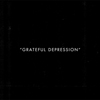 Night Minutes
Night Minutes
Grateful depression
self-released
As with any recent addition to a niche subgenre, newcomers to the '60s girl group/surf rock-inspired scene are going to be compared to the movement's forerunners and inspirations. Night Minutes' debut full-length is sure to receive at least a handful of comparisons to fellow Scandinavians The Raveonettes (It's a Trap! already got that ball rolling a year ago with a review of the song "Sweetheart at the funeral" from their self-titled EP), and while these comparisons can be useful to establish an idea of the band's sound, with smaller subgenres these parallels can prove limiting -- if I'm already into The Raveonettes and Glasvegas, I may feel that I've reached my saturation point for jangly, Jesus and Mary Chain-esque indie pop and not even bother to read past the first mention of Phil Spector. Night Minutes certainly share characteristics with groups like The Raveonettes and Glasvegas, especially in the latter two's darker moments, but it is where the overlap ends that the band comes into its own. As a few critics noted with Weekend's debut "Sports", there are numerous places on "Grateful depression" where '60s pop and post-punk coalesce, somewhat unsurprising given the years band member Max J Hansson spent with prior act Cut City, and with the prominent use of electronic drums and synths one can find echoes of New Order throughout the album. And there is an edginess to "Grateful depression" that is often lacking on their contemporaries' records, moments like the end of "Purely hated" where the distorted pop shifts into a near-breakdown -- with acts like The Raveonettes, overproduction often undercuts the impact of their heavier moments, reducing walls of distortion to torrents of white noise. While only an eight-track record, "Grateful depression" is surprisingly hard to grow weary of, and spared of weak songs it can be enjoyed in its entirety. Summer might be drawing to a close, but there's enough sun and shadow to make this offering more than just a summer record.
- Lars Garvey Laing-Peterson